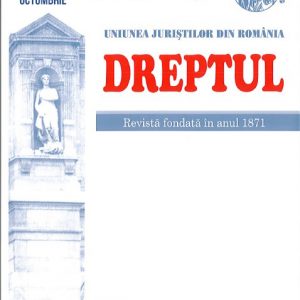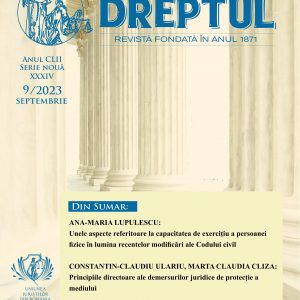-
 Celebrating the Day of Justice is a good opportunity for the theoreticians and the practitioners of law to subject to reflection topics of a particular interest, legislative and jurisprudential solutions, or de lege ferenda aspects. Such an event also enables the evaluation of the institutional relations between the authorities that have a well-defined constitutional role in exercising the judicial authority, as well as of the contribution of the different legal professions to the general and complex law enforcement process. From this perspective, the author emphasizes not only the importance of the celebration reunion of the representatives of the main institutions and professional organizations of jurists, but also the requirement for such an event to be marked by scientific manifestations, in which the participants to make known their own researches in the field, to debate in a spirit of fellowship and solidarity issues facing justice as a public service, the statute of magistrates, as well as of the other legal professions. In a way, every man of law is responsible for the triumph of the idea of justice in his profession.
Celebrating the Day of Justice is a good opportunity for the theoreticians and the practitioners of law to subject to reflection topics of a particular interest, legislative and jurisprudential solutions, or de lege ferenda aspects. Such an event also enables the evaluation of the institutional relations between the authorities that have a well-defined constitutional role in exercising the judicial authority, as well as of the contribution of the different legal professions to the general and complex law enforcement process. From this perspective, the author emphasizes not only the importance of the celebration reunion of the representatives of the main institutions and professional organizations of jurists, but also the requirement for such an event to be marked by scientific manifestations, in which the participants to make known their own researches in the field, to debate in a spirit of fellowship and solidarity issues facing justice as a public service, the statute of magistrates, as well as of the other legal professions. In a way, every man of law is responsible for the triumph of the idea of justice in his profession. -
 Availability and predictability of law – essential attributes of quality thereof – are and will certainly be some of the most common grounds for the conventional and constitutional control, not only because these legal requirements stand for fundamental premises of regulating and self-regulating social behaviour in a democratic society, but also because, inevitably, legal regulation always maintains a paradox, apparently insoluble: “the generality of the law” and its “accuracy”. Case law of the European court and the Romanian constitutional litigation court on the availability and predictability of the law is already sufficiently relevant to justify at least a synthetic outline in this area. This is what we attempt to do hereinafter.
Availability and predictability of law – essential attributes of quality thereof – are and will certainly be some of the most common grounds for the conventional and constitutional control, not only because these legal requirements stand for fundamental premises of regulating and self-regulating social behaviour in a democratic society, but also because, inevitably, legal regulation always maintains a paradox, apparently insoluble: “the generality of the law” and its “accuracy”. Case law of the European court and the Romanian constitutional litigation court on the availability and predictability of the law is already sufficiently relevant to justify at least a synthetic outline in this area. This is what we attempt to do hereinafter. -
 Recognizing the climate emergency, and officially assuming the objectives of limiting the temperature growth up to 2 ° C and carbon neutrality work as an impulse for the establishing the constitutional basis of an adequate juridical and political reaction and for the institutionalizing the State’s and public authorities’ obligation to act against climate change. The presen ce of express referrals to climate in 10 fundamental laws and the ongoing initiatives for their modification and update in the sense of „climatizing” the pertinent provisions, reflect a vigorous process of constitutionalizing of the eco-climatic issues. Until then, assimilating climate to the enveloping concept of environment allows the extensive interpretation of existing dispositions, but the consolidation of the trend and the expression of the demands of the environmental transition impose inserting express constitutional provisions, well-articulated to the juridical and constitutional system as a whole. In this context, a special part is to be played by case law that by creative interpretation of existing text, supplies the directly regulated means of expression and suggest its apparition and its meanings. Regarding the Constitution of Romania, by interpreting the existent provisions (Article 35 which recognizes the right to a healthy and ecologically balanced environment, Article 44 (7), and Article 135 (2) E and F), one can apprehend the general duty of any person, of the State, and of the public authorities, to protect and improve the environment, including climatically, the principle of non-regression and of constant progress in the field. The case law of the Constitutional Court of Romania, as well as the ECHR, is predisposed to „acclimatizing” developments, even if, for the time being, it has not had the chance to manifest itself notably in this direction. Under the impulse of international developments and of the strategic EU context (the Green Deal, the Climate Pact), more and more propositions come to life, in the sense of inscribing climate within the contents of the fundamental law.
Recognizing the climate emergency, and officially assuming the objectives of limiting the temperature growth up to 2 ° C and carbon neutrality work as an impulse for the establishing the constitutional basis of an adequate juridical and political reaction and for the institutionalizing the State’s and public authorities’ obligation to act against climate change. The presen ce of express referrals to climate in 10 fundamental laws and the ongoing initiatives for their modification and update in the sense of „climatizing” the pertinent provisions, reflect a vigorous process of constitutionalizing of the eco-climatic issues. Until then, assimilating climate to the enveloping concept of environment allows the extensive interpretation of existing dispositions, but the consolidation of the trend and the expression of the demands of the environmental transition impose inserting express constitutional provisions, well-articulated to the juridical and constitutional system as a whole. In this context, a special part is to be played by case law that by creative interpretation of existing text, supplies the directly regulated means of expression and suggest its apparition and its meanings. Regarding the Constitution of Romania, by interpreting the existent provisions (Article 35 which recognizes the right to a healthy and ecologically balanced environment, Article 44 (7), and Article 135 (2) E and F), one can apprehend the general duty of any person, of the State, and of the public authorities, to protect and improve the environment, including climatically, the principle of non-regression and of constant progress in the field. The case law of the Constitutional Court of Romania, as well as the ECHR, is predisposed to „acclimatizing” developments, even if, for the time being, it has not had the chance to manifest itself notably in this direction. Under the impulse of international developments and of the strategic EU context (the Green Deal, the Climate Pact), more and more propositions come to life, in the sense of inscribing climate within the contents of the fundamental law. -
 This study is devoted to a particular analysis of the reason for contestation for annulment provided by Article 503 (2) point 2 of the Civil Procedure Code, text which allows the cancellation of a judgment when it is found that „the solution given to the recourse” is the result of a „material error”. The author argues that the mentioned text does not allow a broad interpretation, namely in the sense that the material errors could lead to the cancellation of a judgment for mistakes that concern the merits of the case. The current regulation does not provide sufficient arguments for a different approach than the one promoted under the influence of the previous Civil Procedure Code, and this despite the fact that Article 318 (1) of this Code was using the phrase „material mistake”, and not that of „material error”. In the author’s view the whole physiognomy of the contestation for annulment is materialised in the fact that this extraordinary legal remedy was made available to the parties only for the removal of some procedural errors, and not of those on the merits as well. In order to remedy some misjudgments it is open the means of appeal, and, in some cases, of the revision as well. However the contrary opinion has the merit to emphasize that there are practical situations in which the current procedural remedies could be considered as insufficient. Therefore, some future legislative approaches might also consider some reassessments concerning the regulation of the legal remedies.
This study is devoted to a particular analysis of the reason for contestation for annulment provided by Article 503 (2) point 2 of the Civil Procedure Code, text which allows the cancellation of a judgment when it is found that „the solution given to the recourse” is the result of a „material error”. The author argues that the mentioned text does not allow a broad interpretation, namely in the sense that the material errors could lead to the cancellation of a judgment for mistakes that concern the merits of the case. The current regulation does not provide sufficient arguments for a different approach than the one promoted under the influence of the previous Civil Procedure Code, and this despite the fact that Article 318 (1) of this Code was using the phrase „material mistake”, and not that of „material error”. In the author’s view the whole physiognomy of the contestation for annulment is materialised in the fact that this extraordinary legal remedy was made available to the parties only for the removal of some procedural errors, and not of those on the merits as well. In order to remedy some misjudgments it is open the means of appeal, and, in some cases, of the revision as well. However the contrary opinion has the merit to emphasize that there are practical situations in which the current procedural remedies could be considered as insufficient. Therefore, some future legislative approaches might also consider some reassessments concerning the regulation of the legal remedies. -

-
 In this article, the author emphasizes the main amendments brought to the Romanian criminal and criminal procedure legislation by Law no. 202/2010 regarding certain measures to accelerate the resolution of trials.
In this article, the author emphasizes the main amendments brought to the Romanian criminal and criminal procedure legislation by Law no. 202/2010 regarding certain measures to accelerate the resolution of trials.
